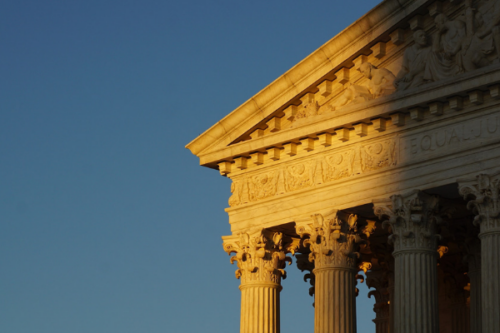Q+A
A one for one replacement: Breyer’s legacy and future of the Supreme Court
Maya Sen, an expert on the politics of the judiciary, comments on Breyer’s legacy, his likely replacement, and the Supreme Court’s rightward shift.

As Supreme Court Justice Stephen Breyer announces his retirement after 28 years on the bench, President Joe Biden is poised to make his first appointment to the court. To discuss the impact of Breyer’s retirement, what the future of the court holds, and how Americans view an increasingly polarized judiciary, we spoke to Maya Sen, professor of public policy at Harvard Kennedy School and co-director of the Supreme Court Public Opinion Project.
Ash Center: What does Breyer’s retirement mean for the future of the court?
Maya Sen: The court is fractured, with a very strong conservative majority of six justices and a minority of three liberal justices. Breyer’s retirement means that a liberal seat is going to open up and that Biden is going to be able to hold that liberal seat for the Democrats. So, it’s basically not conceding any more territory to Republicans. Because of that, Biden being able to appoint someone to the seat is not going to change the internal dynamics on the Supreme Court a tremendous amount, even if he’s able to appoint someone who is young and progressive. At the end of the day, it’s still going to be a six to three conservative majority for the foreseeable future. And that means that it’s going to be a conservative majority on all kinds of blockbuster issues that are coming up, including abortion, gun rights, affirmative action, environmental protections, presidential powers, and more.
What role did Breyer play on the court, and how are is his nearly three decades of service there likely to be remembered?
As a social scientist, I tend to take a very pragmatic outcomes-oriented approach to the Supreme Court. In my view, Breyer will be viewed primarily as a solid member of the now-small liberal bloc—but also as someone who often articulated a pragmatic and consistent center-left viewpoint. Also, I think he’ll be remembered for his many attempts to defuse perceptions of the court as a partisan institution, the topic of his latest book. There are lots of wonderful stories about him trying to build bridges across the ideological divides on the court, most famously after the divisive opinion of Bush v. Gore.
That said—and I’m not sure he would like this very much—I also think he will be remembered by some as being wise in his decision to step down when he did. That’s very much in contrast to his colleague Ruth Bader Ginsburg, whose legacy has been viewed as tarnished in some circles by her decision not to step down when President Obama was in office.

Biden has pledged to fill a Supreme Court vacancy with a Black woman, who would be the court’s first such appointee. What are some of the considerations that you think Biden is likely considering in announcing Breyer’s successor?
Biden has already announced his intent to appoint a Black woman justice, which I think would be hugely important for the court. There’s never been a Black woman on the court, yet Black women are more affected than most by the decisions that the Supreme Court reaches—from reproductive rights to affirmative action. The best social science evidence also suggests that there’s something meaningful and important about having a court system that demographically reflects the country’s population. It would be a historic moment for sure.
I also suspect that Biden and his team are making important, albeit purely political calculations. Black women make up an important part of the Democratic Party constituency, and Biden is looking at what is likely to be a rough midterm election for Democrats. The announcement of the court’s first Black female justice could be a potentially galvanizing factor for African American voters. It may have the effect of getting people to turn out who maybe otherwise would’ve sat at home, especially in light of the failure to pass voting rights legislation.
That raises the question of what the Republican response to a Biden court pick may look like.
Perhaps surprisingly, I think that the politics around this appointment are likely to be less heated than other recent appointments, in part because Democrats control the Senate. Also, everyone understands that this appointment is not going to change the balance of power on the court. So, if you’re a Republican senator, why would you make this the hill that you die on?
Of course, this does depend on who the nominee is. If I had to guess, I think what’s likely to happen—given the polarization in Congress and how unlikely Republicans are to want to be seen helping Biden—is that the confirmation will be close to a party-line vote. Maybe a few moderate Republicans who aren’t up for election soon will end up supporting Biden’s pick. But, otherwise, most Republicans will vote against.
That’s just a reflection of where our party politics are right now. But even if this ends up being largely a party-line vote, I don’t necessarily see this nomination as creating the kind of partisan fireworks that have characterized the last few nominations.
What can Breyer’s retirement and the coming debate over filling his seat mean for how the public views the court?
In political science, we put a lot of importance on the identity of the court’s “median”—or the court’s ideological middle—because that person has a tremendous amount of power over the ultimate outcome of a court decision. In the last few years, we’ve gone from moderate-conservative Anthony Kennedy as the median to conservative John Roberts. Now we’ve shifted it to the right yet again, over to Brett Kavanaugh, who’s very conservative compared to the average American.
We’re starting to see the consequences of that pretty strong rightward shift in the court’s declining ratings. There is no question that, in the last couple of years, the court has taken a hit in terms of its popularity as it has moved further to the right, after the appointments of Justices Gorsuch, Kavanaugh, and Barrett. A lot of that declining support has come from Democrats because they are seeing the resulting policy and political consequences of that shift. I think if Biden can successfully get a popular nominee on the court it may shore up some of that softening support, as many Democrats may feel more optimistic about the court. Of course, the court is still going to be dominated by a supermajority and seems poised to advance a raft of conservative judicial decisions on issues ranging from gun rights to abortion, to affirmative action, so it will be interesting to see how Democrats in particular react.
